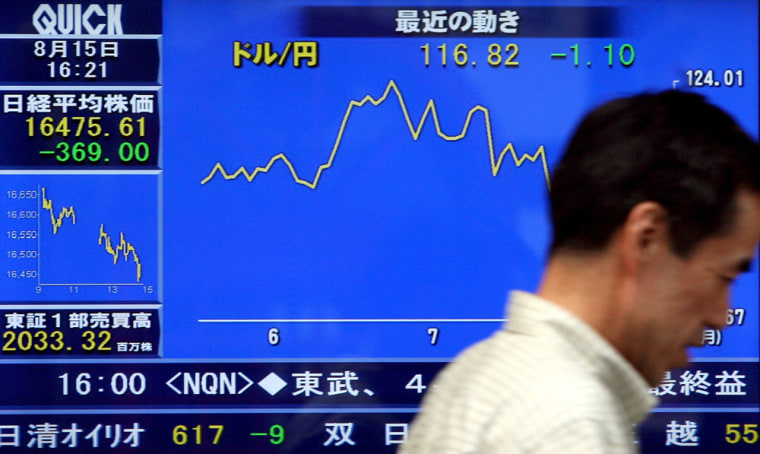Global markets dipped Wednesday on persistent jitters over the credit crunch started by problems in the U.S. subprime loan sector, and now broader concern about the nation’s economy.
The U.K’s FTSE-100 dipped 0.6 percent to 6,106.50. France’s CAC-40 declined 0.6 percent to 5,444.12 and Germany’s DAX lost 0.5 percent to 7,386.2. Asia, Tokyo and New Zealand benchmarks closed at nine-month lows.
“Market volatility is going to continue until the extent of the problem is properly known,” said Richard Hunter, head of equities at Hargreaves Lansdown stockbrokers. “It may take a few weeks for positions to unwind and for banks to hold their hands up and reveal how much they are exposed to.”
Stocks in the U.S. wobbled after the Dow Jones industrial average briefly dipped below 13,000 as Wall Street kept a close eye on the Federal Reserve and how much more cash it might inject into the banking system. The Dow industrials then rose 0.30 percent to 13068.59, the S&P 500 Index edged up .08 percent to 1432.22, while the Nasdaq Composite Index rose 0.3 percent to 2506.66.
Japanese export issues also took a battering from the strong yen. Worries about a slowdown in the U.S. economy have grown, fueled by faltering profit forecasts by major retailers Tuesday including the world’s largest, Wal-Mart Stores Inc.
In Asia, some economists and dealers said the stock market gyrations were short-term. Some issues could even be good bargains, they said, given the strong growth and earnings data from China, Japan and other regional economies.
In Brazil, the main index for the Bovespa exchange dropped 0.3 percent to 50,758.5. Brazil’s currency, the real, traded above the psychologically important 2-to-the-dollar level for the first time in months.
There was no sign Wednesday that the European Central Bank would inject even more money into the markets to alleviate nervous banks as a weekly tender of 292.5 billion euros ($397.54 billion) and a one-day loan of 7.7 billion euros ($10.47 billion) came due.
Tuesday’s one-day offer from the ECB — much smaller than cash infusions during the previous three trading days — brought the total amount lent since Thursday to 211 billion euros ($286.77 billion).
Major central banks around the world have provided extra funds, but on a smaller scale, and central banks in Japan and Australia have even begun draining funds from the money market.
The Nikkei 225 stock index, the benchmark for Asia’s biggest stock market, plummeted 2.2 percent to 16,475.61, its lowest since Dec. 8, as financial issues were rattled by fallout from the U.S. subprime mortgage crisis.
Weak American spending would be a blow to the Japanese and other Asian economies, which are heavily dependent on exports to the U.S.
The Dow Jones industrial average shed 1.6 percent to 13,028.92 on Tuesday, on the verge of falling below the psychologically important 13,000 mark, which it first crossed in late April.
“It’s not a particularly pretty day for the market. World markets are all just following each other at the moment and they’re quite skittish,” said UBS equities director Paul Nicolson in New Zealand, where the benchmark NZX-50 index slipped below the psychological 4,000 barrier before ending down 1.5 percent at 4,004.46 — its lowest closing since December 2006.
Hong Kong’s Hang Seng Index fell 2.9 percent to 21,375.72, and Singapore’s Straits Times Index fell 3.4 percent to close at 3,273.25.
“We remain confident that things can calm down,” said David Cohen, director of Asian forecasting at Action Economics in Singapore. “There is enough momentum in the global economy it should ultimately sustain the solid growth in world GDP through the middle of the year.”
In the short term, though, Cohen warned more bad news could be expected about troubled hedge funds, which could set off another drop in regional stocks.
